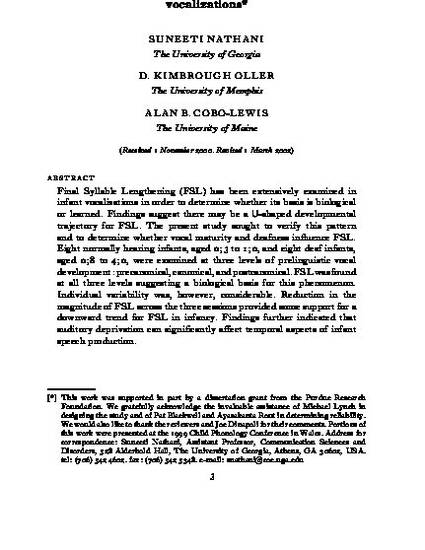
Article
Final Syllable Lengthening (FSL) in Infant Vocalizations
Journal of Child Language
Document Type
Article
Publication Date
2-1-2003
Disciplines
Abstract/ Summary
Final Syllable Lengthening (FSL) has been extensively examined in infant vocalizations in order to determine whether its basis is biological or learned. Findings suggest there may be a U-shaped developmental trajectory for FSL. The present study sought to verify this pattern and to determine whether vocal maturity and deafness influence FSL. Eight normally hearing infants, aged 0 ; 3 to 1 ; 0, and eight deaf infants, aged 0 ; 8 to 4 ; 0, were examined at three levels of prelinguistic vocal development: precanonical, canonical, and postcanonical. FSL was found at all three levels suggesting a biological basis for this phenomenon. Individual variability was, however, considerable. Reduction in the magnitude of FSL across the three sessions provided some support for a downward trend for FSL in infancy. Findings further indicated that auditory deprivation can significantly affect temporal aspects of infant speech production.
Citation/Publisher Attribution
Nathani, S., Oller, D.K., & Cobo-Lewis, A.B. (2003). Final Syllable Lengthening (FSL) in Infant Vocalizations. Journal of Child Language, 30, 3-25. Available on publisher's site at http://journals.cambridge.org/abstract_S0305000902005433
Publisher Statement
Copyright 2003 Cambridge University Press
DOI
10.1017/S0305000902005433
Version
publisher's version of the published document
Citation Information
Suneeti Nathani, D. Kimbrough Oller and Alan Cobo-Lewis. "Final Syllable Lengthening (FSL) in Infant Vocalizations" Journal of Child Language Vol. 30 Iss. 1 (2003) p. 3 - 25 Available at: http://works.bepress.com/alan_cobo-lewis/3/